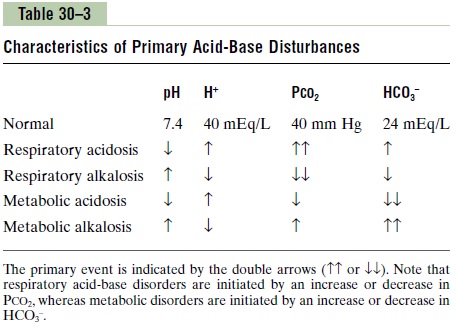Chapter: Medical Physiology: Regulation of Acid-Base Balance
Alkalosis Increases the Ratio of HCO3-/H+ in Renal Tubular Fluid
Renal Correction of Alkalosis—Decreased Tubular Secretion of Hydrogen Ions and Increased Excretion of Bicarbonate Ions
The compensatory responses to alkalosis are basically opposite to those that occur in acidosis. In alkalosis, the ratio of HCO3– to CO2 in the extracellular fluid increases, causing a rise in pH (a decrease in H+concentration), as is evident from the Henderson-Hasselbalch equation.
Alkalosis Increases the Ratio of HCO3-/H+ in Renal Tubular Fluid
Regardless of whether the alkalosis is caused by meta-bolic or respiratory abnormalities, there is still an increase in the ratio of HCO3– to H+ in the renal tubular fluid. The net effect of this is an excess of HCO3– that cannot be reabsorbed from the tubules and is, therefore, excreted in the urine. Thus, in alka-losis, HCO3– is removed from the extracellular fluid by renal excretion, which has the same effect as adding an H+ to the extracellular fluid. This helps return the H+ concentration and pH back toward normal.

Table 30–3 shows the overall characteristics of res-piratory and metabolic alkalosis. In respiratory alkalo-sis, there is an increase in extracellularfluid pH and adecrease in H+ concentration. The cause of the alkalo-sis is a decrease in plasma PCO2 , caused by hyperventi-lation. The reduction in PCO2then leads to a decreasein the rate of H+ secretion by the renal tubules. The decrease in H+ secretion reduces the amount of H+ in the renal tubular fluid. Consequently, there is not enough H+ to react with all the HCO3– that is filtered. Therefore, the HCO3– that cannot react with H+ is not reabsorbed and is excreted in the urine. This results in a decrease in plasma HCO3– concentration and cor-rection of the alkalosis. Therefore, the compensatoryresponse to a primary reduction in PCO2 in respiratory alkalosis is a reduction in plasma HCO3- concentration, caused by increased renal excretion of HCO3-.
In metabolic alkalosis, there is also an increase in plasma pH and a decrease in H+ concentration.
The cause of metabolic alkalosis, however, is a rise in the extracellular fluid HCO3– concentration. This ispartly compensated for by a reduction in the respira-tion rate, which increases PCO2 and helps return the extracellular fluid pH toward normal. In addition, the increase in HCO3– concentration in the extracellular fluid leads to an increase in the filtered load of HCO3–, which in turn causes an excess of HCO3– over H+ secreted in the renal tubular fluid. The excess HCO3– in the tubular fluid fails to be reabsorbed because there is no H+ to react with, and it is excreted in the urine. In metabolic alkalosis, the primary compensa-tions are decreased ventilation, which raises PCO2 , and increased renal HCO3- excretion, which helps compen-sate for the initial rise in extracellular fluid HCO3-concentration.
Related Topics